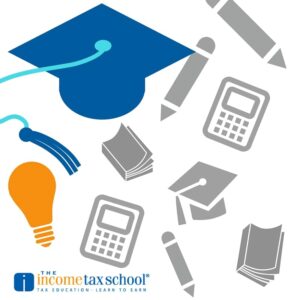As long as there is government, there will be taxes because taxes are what fund our government,  our education, and the various other services we receive as taxpayers. This makes the Tax Industry recession proof (aka a great one to be in)! You don’t have to become a tax preparer to get into the tax industry but you do need to have some level of tax education.
our education, and the various other services we receive as taxpayers. This makes the Tax Industry recession proof (aka a great one to be in)! You don’t have to become a tax preparer to get into the tax industry but you do need to have some level of tax education.
Tax education is more than just learning how to fill out forms, it’s about learning the tax law and how to interpret it. Tax knowledge can take you in many directions, here are some ways you can use a tax education.
Tax Office Manager
Tax Office Managers do more than prepare taxes, they are in charge of the entire office. This means building relationships with new clients, communicating with the entire team, and training new staff.
Tax Advisor
Tax Advisors use their knowledge of the tax law to provide consultancy services to their clients. Tax Advisors consult for both corporations and individuals and take on more of a tax planning role. This role involves keeping up with tax legislation, researching, analyzing and interpreting tax law, establishing and structuring family trusts, estate planning, advising on tax residence and domicile matters, etc.
Sales Tax Analyst
Sales Tax Analysts usually work within large corporations handling their local and state sales tax returns, managing their sales tax documentation, keeping up with licensing, and reviewing and validating customer exemption certificates.
Tax Attorney
Tax Attorneys represent clients on matters of tax law. Whether it’s defending a client during an IRS audit, filing an appeal of a tax court decision, or communicating with the IRS on tax matters, Tax Attorney’s have the authority to represent anyone before the IRS. Tax Attorneys also act as tax preparers and tax advisors for clients.
Bookkeeper
A bookkeeper is charged with recording financial transactions within a company.
Income Tax Accountant
Tax accountants assist clients with their financial and income tax statements. They prepare federal, state, and local returns, advise on minimizing tax liability, calculating earnings, and review client activities to ensure compliance with tax laws.
State Income Tax Manager
A State Income Tax Manager focuses on tax accounting, reporting and compliance at the state tax level.
Federal Income Tax Manager
A Federal Income Tax Manager focuses on tax accounting, reporting and compliance at the federal tax level.
Accountant
Becoming an accountant requires an accounting degree, but knowing tax law is a big part of it. Accountants are in charge of preparing and examining financial records. They make sure that records are accurate and that taxes are paid properly and on time.
Payroll Processor
Payroll processors are responsible for confirming employees’ work hours, computing wages, and issuing paychecks. They also verify attendance and make sure employees receive accurate pay in a timely manner.
Payroll Analyst
Payroll Analysts process weekly or monthly payroll reports, reconcile the payroll accounts and correct the errors, process, balance, report, and distribute W-2 forms, and create budget projections.
Financial Planner
Financial planners help clients asses and plan for all areas of finance. From trusts, investments, insurance and taxes, a financial planner advises you on the big picture.
Tax Business Owner
Maybe entrepreneurship is in the cards for you. Owning a tax business can be very rewarding. Tax business owners can work independently or employ a staff of tax preparers to serve a larger portion of the community.
Teacher of Tax Preparation
That’s what we do!
In addition to all of these jobs, you could also work in a corporate accounting department, work for the IRS or another government agency, or be a tax preparer in a business needing tax professionals to handle client work – like a CPA firm. There’s a lot you can do with tax education. What are you waiting for?
